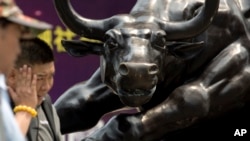Stock markets in mainland China had a volatile day of trading Monday following government steps aimed at halting a three-week slide.
Chinese stocks have lost about $2.7 trillion since June 12, shaking investor confidence at a time when China’s economy is already slowing.
Xiao Gang, chairman of the China Securities Regulatory Commission, vowed to maintain the stock market’s stability Saturday morning, setting off a series of measures by state-backed entities aimed at reassuring investors.
Shortly after Xiao’s statement, 21 brokerages announced that they would spend no less than $19.3 billion, or 15 percent of their net assets, to buy exchange-traded funds (ETFs), which invest in the nation’s blue-chip companies.
State media reported that the People’s Bank of China and China’s sovereign wealth fund will also provide additional liquidity for stock purchases, however central bankers provided no specifics about the plan.
Additionally, 28 Chinese companies said that they had suspended plans for initial public offerings, which had already been approved by regulators in Shanghai and Shenzhen.
Despite the extraordinary steps, analysts remain divided over whether they will halt the slide, or merely delay it.
Lu Suiqi, associate professor of economics at Peking University, warns that the government’s package appears to be so drastic that it could artificially inflate the market, making it even more difficult to correct.
“The market’s drastic fluctuations earlier were a result of the burst of huge bubbles, created by the previous bull market," he said. "If the government’s upcoming market stabilization package includes overly aggressive measures, history may repeat itself.”
He also says the nation’s worse-than-expected economic fundamentals and many of the market’s relatively over-priced shares, as indicated by price-to-earnings (PE) ratios above 100, make it irrational to push share prices higher.
But Liao Qun, chief economist of China CITIC Bank International, argues that it is inevitable for the government to step in and maintain the health of the markets, where individual private investors — so-called retail investors — account for 90 percent of the trading.
“China’s stock markets haven't yet fully matured as free markets. So, under such circumstances, it still requires the government to intervene,” he said, adding that he expects the package to provide short-term support although it is too early to tell how effective the plan will be at shoring up the broader market.
Monday, one day after the measures started, the Shanghai Composite climbed 2.41 percent, while the Shenzhen Composite dropped another 1.39 percent.
Richard Koo, chief economist of Nomura Research Institute in Tokyo, says Beijing’s package reminds him of similar measures Japan used some 20 years ago to shore up its own markets. He says most of those policies ended up not making much financial sense, but some succeeded in calming investors.
Instead of focusing on the market losses, Koo says Beijing should turn most of its attention to China's broader economy, which has been slowing over recent months with lower than expected factory output and retail sales.
“The macro economy is losing quite a bit of momentum now. I am sure Chinese authorities can handle this this slowdown. And some of the slowdown is actually quite good for the Chinese economy,” he said.
But if the Chinese government doesn't enough on the macro side, he added, "then, eventually, the share prices may not respond the way the government would like it to respond."




